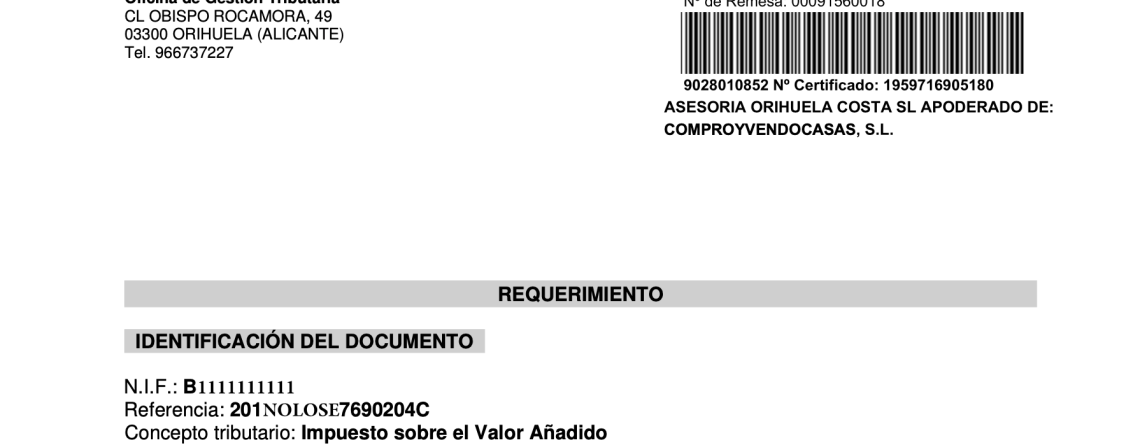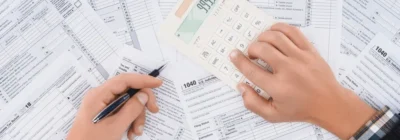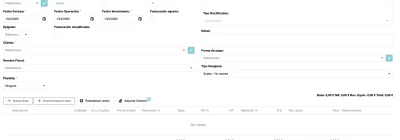Find out all about the tax gov check for self employed in Spain
Patrick Gordinne Perez2023-12-09T18:41:49+00:00Today we will talk about an important topic for the self-employed: the tax gov check for self-employed in Spain. Have you ever wondered what a tax inspection is and why the self-employed may be subject to it? In tax jargon, this is called the dreaded “tax demand“.
The tax office in Spain (AEAT) monitors everything and is doing more and more inspections and there is a requirement for each tax but here we are going to focus on the tax compliance of the self-employed and how to respond to a requirement of the tax authorities.
In recent years it has become increasingly common for the self-employed to be subject to checks on their declared income and expenses. See what these procedures consist of and how to act.
Introduction: What is a tax goc check and why are self-employed people subject to it?
A tax gov check for self employed is a process in which the tax authorities examine a person’s or company’s tax obligations in detail. In the case of the self-employed, these tax audits are particularly relevant, as they are responsible for managing their taxes on their own account.
But don’t worry, dear self-employed. These inspections should not be seen as negative or intimidating. On the contrary, they are opportunities to demonstrate your transparency and compliance with your tax obligations.
Remember that being self-employed means taking on certain responsibilities and keeping your accounts in order. Keep clear and accurate records, comply with your tax returns and keep up to date with your taxes.
Don’t be afraid of tax audits, but use them as an opportunity to grow and improve as a freelancer. Show your commitment to legality and fiscal transparency!
Always remember that you are capable of overcoming any challenge that comes your way as a freelancer – trust yourself and keep going!
Common reasons why a self-employed person may be selected for a tax inspection
Occasionally, self-employed persons may be selected for a tax audit for a variety of reasons.
- These tax gov check for self employed may be the result of random sampling to ensure transparency and fairness in the tax system.
- One of the common reasons why a self-employed person may be selected is the existence of discrepancies in their tax returns. If significant differences are detected between the income declared and the expenses incurred, this may draw the attention of the tax authorities.
- Another reason is when irregular or unusual economic activity is suspected. If the self-employed person carries out transactions or has financial movements that are not consistent with his or her usual activity, this could generate suspicion and lead to an inspection. Every year, the AEAT publishes the tax control plan on its website, which states which activities will be subject to the most inspections.
- In addition, anonymous complaints or reports can also trigger an inspection. If someone submits information about possible tax irregularities committed by a self-employed person, the authorities may decide to investigate and carry out a thorough review.
It is important to remember that going through an inspection does not necessarily mean that an offence has been committed. It is simply part of the process of ensuring tax compliance and maintaining the integrity of the tax system.
As self-employed, we must always ensure that we conduct our business activities within the established legal framework and keep clear and accurate records. In this way, we can avoid uncomfortable situations such as these inspections and concentrate on developing our business with confidence and financial peace of mind.
How to prepare properly for a tax audit and avoid problems
Proper preparation for a tax audit is key to avoiding problems and maintaining peace of mind! Diligent bookkeeping and maintaining complete supporting documentation are essential to demonstrate transparency and compliance with tax obligations.
Remember that having specialised tax advice can make all the difference. An expert in the field will guide you through every step of the process, making sure you are up to date with all tax regulations and helping you avoid potential errors that can lead to inconvenience.
Our experience is that taxpayers do not intend to defraud but they do make many mistakes that cause the tax authorities to react with an inspection.
Don’t forget to comply strictly with your tax obligations. Paying your taxes on time and filing the required returns demonstrates your commitment as a responsible taxpayer.
So, prepare properly, keep your accounts in order, seek professional advice and comply rigorously with your tax obligations. With determination and responsibility, you will be able to face any tax audit without fear!
What to do during a tax audit: practical tips to stay calm and protect your rights as a self-employed person
During a tax gov check for self employed, it is natural to feel a certain amount of stress and worry. However, it is important to stay calm and remember that you have rights as a self-employed person.
One of the keys to dealing with a tax audit is to establish positive cooperation with the inspector. Maintain a respectful and cooperative attitude, answering questions clearly and honestly.
In addition, you have the right to ask the inspector for the reason and scope of the inspection. This will allow you to understand what specific aspects are being reviewed so that you can provide the necessary information.
Don’t forget that you also have the right to present relevant evidence and documents to support your tax situation. Prepare in advance all necessary documents, such as invoices, contracts or other financial records that demonstrate your tax compliance.
Remember that transparency and compliance are essential during a tax audit. Keep your records in order and make sure you are up to date with your tax obligations.
Be confident in yourself! Approach this situation with composure and confidence in your knowledge as a self-employed person. Remember that you are protected by your legal rights and be confident in your ability to prove your tax performance.
Don’t be discouraged! An inspection can be an opportunity to improve your accounting practices and strengthen your self-employed business. Stay calm, protect your rights and move forward with determination towards a successful financial future.
Initial requirements
First requirement.
If you are self-employed, you should know that these checks usually begin with a request from the tax authorities to provide your income, expenditure and investment asset ledgers, which they will use to check that the information matches the data included in your tax returns.
Second request.
The tax authorities may then ask you again to provide a copy of all or some of the invoices that appear in the record books. Note. The most common is to request invoices for expenses, as the aim is to check that these correspond to expenses that are related to your activity and that are necessary to obtain the income (in this way the Tax Authorities determine whether they can be deducted for Personal Income Tax and VAT purposes).
Deadline for replying.
The Inland Revenue will give you ten working days (not counting holidays, Saturdays or Sundays) to reply to the requirements. Note. And you have the option of requesting an extension of up to five days, which is granted automatically if requested before the last three days of the initial deadline. However, this extension must not be to the detriment of third parties.
How to deal with assessments and/or possible penalties or summonses following a tax inspection
Don’t worry! Faced with possible sanctions or requirements following a tax inspection, there are always options to act and resolve the situation favourably.
Settlement proposal.
The best thing that can happen after these two requirements is that you are notified that everything is fine and that it is not necessary to regularise your tax situation.
Be careful! However, if the Tax Authorities consider that there are any irregularities, they will send you a provisional (also known as a “parallel”) settlement proposal, recalculating the personal income tax or VAT self-assessment and granting you a new period (of between ten and fifteen days) to make allegations and provide the documents you consider appropriate.
Allegations.
Make sure you submit all the documents and evidence within the time limit for allegations.
Attention! The courts have allowed them to be submitted later (in subsequent proceedings), but only under certain circumstances (e.g. when there is no bad faith on the part of the taxpayer or the new documents submitted do not entail new investigative activity for the tax authorities or the economic-administrative courts). Therefore, to avoid problems, it is better to file everything from the beginning.
Do not allow extensions.
It may also happen that, when notifying you of the tax assessment proposal, the tax authorities take the opportunity to extend the scope of the audit (for example, they may ask you at that time for details of your vehicle to check whether it is really used for the activity). Caution! If you find yourself in this situation, appeal against the subsequent provisional tax assessment and request its cancellation. The extension of the scope of the proceedings must be made before notifying the proposed assessment, also stating the reasons justifying it.
Provisional assessment.
Finally, if the Tax Authorities do not accept your allegations and consider that the self-assessment submitted should be regularised, they will send you a provisional assessment. In this case, you will be obliged to make the payment required by the Inland Revenue (or you can request a deferment and pay at a later date).
Note. You can also suspend payment of this debt by lodging an appeal for reconsideration with the tax authorities or an economic-administrative claim (in both cases you must provide guarantees of payment).
The Inland Revenue may agree to extend the scope of this type of verification, but it must do so before notifying the tax assessment proposal and must state the reasons justifying the extension.
Conclusion: Don't be afraid of a tax inspection, be a responsible and transparent self-employed in your tax obligations.
First of all, it is important to remember that you have the right to lodge an appeal for reconsideration and/or an economic-administrative claim against unfavourable rulings. Do not remain silent and seek legal advice specialised in tax and fiscal matters. An expert in the field will be able to evaluate your case and provide you with the necessary support to present a solid defence.
Remember that every situation is unique and requires a personalised approach. Don’t hesitate to seek professional help to ensure you make the best legal decisions. With the right advice, you will be able to face any injunction or sanction with confidence and determination.
Stay calm, trust yourself and remember that solutions are always available – don’t give up! Learn from this experience and use it as an opportunity to grow both personally and professionally – you have the power to overcome any obstacles that stand in your way of financial success!






